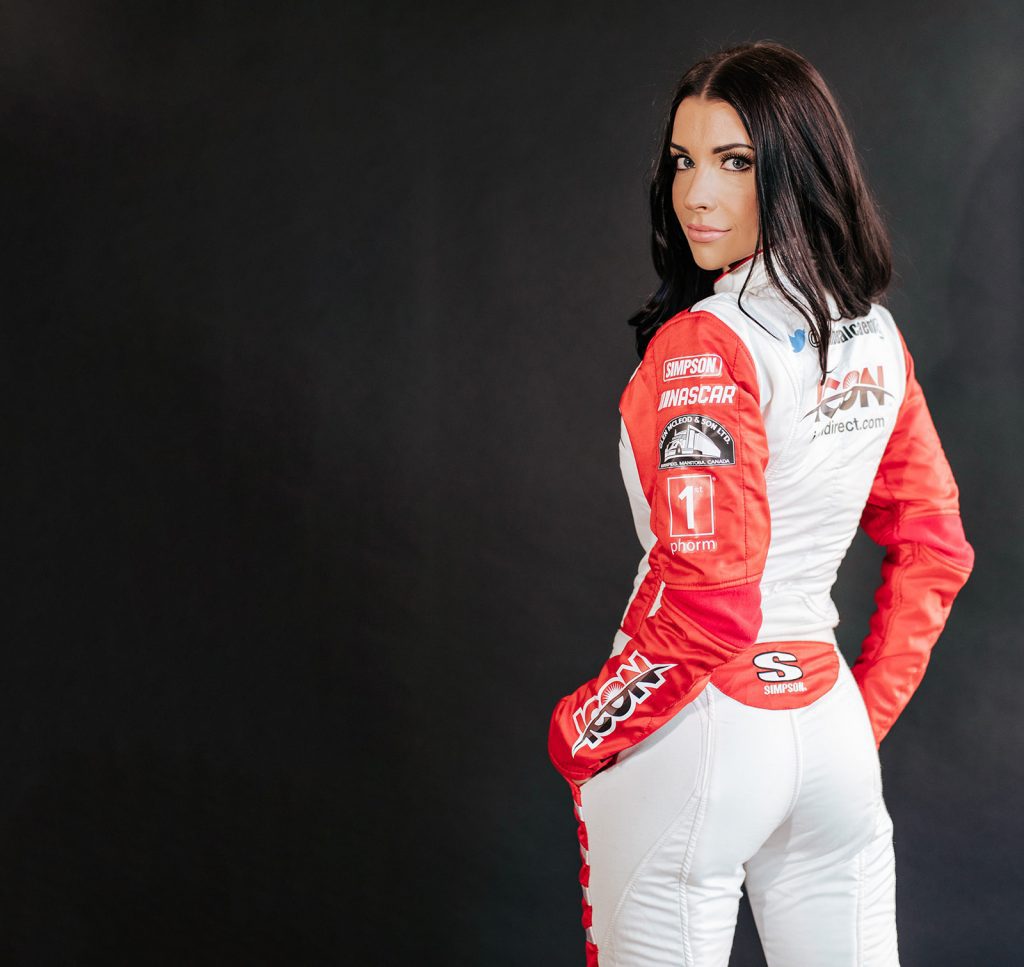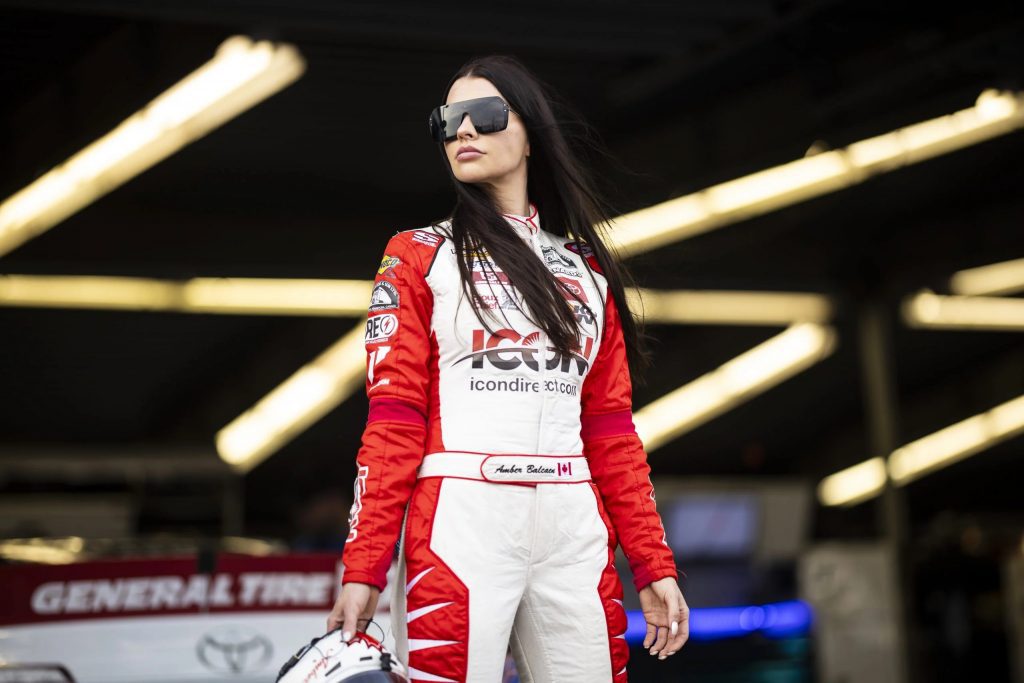On the night of July 11, 2020, Amber Balcaen woke up in an ambulance positive she was paralyzed.
“I can’t feel my arms or legs,” she exclaimed to paramedics, who administered a dose of adrenaline. As the medication made its way to her extremities, Balcaen’s sense of feeling returned. But she was still suffering from a collapsed lung, a concussion and burns on her arms.
Then 28, the racer from Winnipeg, Manitoba, Canada had been involved in a vicious midget car accident at Valley Speedway in Grain Valley, Missouri. Her car flipped multiple times before lodging itself into the dirt track’s exterior fencing.
Balcaen remembers waking up while hanging upside down in her car. She also remembers awaking a second time, in the aforementioned ambulance. She has no recollection of the fact that she actually climbed out of her race car and walked to the emergency vehicle.
Balcaen was taken to the hospital, where she was forced to evaluate her racing career and assess her priorities. “I don’t know if this is worth it,” she thought.
Three days later, when she was healed and discharged, Balcaen’s tune had flipped. She left the hospital having consulted with her doctors on how quick she could return to the driver’s seat, and what recovery process was necessary.
Balcaen credits her physical fitness as a factor that expedited her rehabilitation. She said the most challenging aspect of her comeback was sitting around doing nothing; she had to rest quietly in dark rooms as part of her concussion treatment.
She returned to racing in just a couple months.
“I’ve never had a plan B,” said Balcaen, now 31 and preparing to chase the 2024 ARCA Menards Series championship with a full schedule racing for powerhouse team Venturini Motorsports. “It just goes back to the fact that I couldn’t see myself doing anything else in life. I just wanted to race cars. It’s what brings me so much happiness, and disappointment. Nothing fills me emotionally like racing does.
“I’m addicted to it.”

‘I KNEW I WASN’T GOING TO BE NORMAL’
Despite the fact that Balcaen’s father, grandfather, uncle and cousins are dirt-track racers, in many ways, her career is an anomaly. There’s not exactly an abundance of female asphalt stock-car drivers from Winnipeg.
That’s why Balcaen’s mother never raced even though she had the itch to do so. Kim Balcaen instead supported her husband Mike Balcaen’s career as part of the family motorsports operation, but she was an ally for her daughter when a 10-year-old Amber decided she wanted to compete in a go-kart. Mike’s apprehension was the dedication (and cost) required to race.
“[My mom] told my dad, ‘I didn’t get to race, and you can’t do that to her. If she wants to race, you gotta let her race,’” Amber Balcaen said. ‘He was like, ‘Alright, I’ll let her race, but she’s gotta come up with the sponsorship. She has to figure out how to buy a go-kart and work on the go-kart.
“’She has to know what this all entails.’”

At just 10 years old, Balcaen collected enough money to buy a go-kart. She did so by making phone calls and attending swap meets with her father, selling stickers and asking some of his sponsors for a little help. Her father taught her how to clean the chains and bearings on her kart, how to change the tires, etc.
Through the years and despite introductions of other extracurricular hobbies — volleyball, cheerleading, gymnastics, horse back riding, dance, piano — Balcaen’s passion for motorsports blossomed. On the weekends, while her friends stayed in Winnipeg, Balcaen and her father often traveled to the dirt tracks of North Dakota and Minnesota. She recalls week-day expeditions, too, when her dad would sign her out of school on a Wednesday afternoon so the duo could compete that night and return home for school and work the next day.
She was good. And the karting victories only fueled her desire to keep racing while her peers drifted to other amusements.
“I definitely always felt different,” Balcaen said. “And it’s not like my parents made me do that or anything. I wanted to do it. I loved being at the track. Even if I wasn’t racing, I loved just watching my dad, or watching my cousins and uncles. It always felt like home to me. It’s always where I wanted to be.”
Balcaen progressed from karts to mini sprints and 410 sprint cars, and her success at those levels brought her to the realization that a legitimate career in racing was possible.
For a brief time in her life, though, the sentiment was fleeting. Balcaen pursued a business degree in college under the impression that her motorsports dreams were unrealistic. That assumption might have persisted had she not spent a significant amount of time in class daydreaming about racing. Among her final school projects was the ideation of a business plan for Amber Balcaen Racing.
“I had such a fire inside me, and I couldn’t let go of it,” she said. “So I was just like, ‘You know what, I’ve just gotta do it. I have to go for it.’ I always knew I would work for myself in some capacity; I knew I wasn’t going to be normal, but I didn’t know what that would look like.
“I just took the leap of faith.”

Balcaen jokes about how she’s always felt like an outcast, from being bullied for her racing shirts in grade school to now pursuing a NASCAR career as a Canadian woman.
That’s never held her back. Proof lies in the fact that she abandoned her comfort zone in the spring of 2016 and moved more than 2,500 miles from Winnipeg to Charlotte with the intent of becoming the first in her family to transition from dirt to asphalt stock-car racing.
She did so on her own — no relatives, no friends, no money, no legacy and, for a while, no opportunities.
All Balcaen had to reply upon were the connections she made during her involvement in the 2014-15 NASCAR Drive for Diversitydevelopment program combines. One of those connections was Dylan “Mamba” Smith, a fellow combine participant.
Balcaen reached out to Smith with a simple-but-vital inquiry: So, how do I do this?
“At the time, Lee Pulliam had the best stuff,” Smith said of the entry level stock car ranks, referencing the legendary late model driver and team owner. “I was like, ‘If you have the money to go to the best, that’s where to go.’”
Fortunately for Balcaen, Pulliam was receptive to the idea of her racing one of his limited late models, and she was able to acquire sponsorship to run a full season at Motor Mile Speedway (now Pulaski County Motorsports Park) in Fairlawn, Virginia. The results were historic.
On Aug. 27, 2016, Balcaen took the checkered flag at Motor Mile and became the first Canadian woman to win a NASCAR-sanctioned race in the United States.
She remembers the overwhelming emotion of the evening being that of relief; she had nearly won her division’s previous two races before faltering in the closing laps.
“I should have won like three races in a row,” Balcaen said with a laugh. “It was relief, and then is was like, ‘OK, all of my hard work, it’s paid off. And I’m so happy I made this decision to take this leap for my career.’ But then it was like, ‘Hey, what’s next? How do I get to ARCA now?’ And I really thought I would just have all these sponsorships flood in.
“But that’s not the way it happened.”

‘I EARNED MY SPOT’
Balcaen’s entry in the 2020 midget car race that sent her to the hospital was a product of the business side of motorsports.
The COVID-19 pandemic had dried up the funding she was set to receive for a NASCAR run. With the support she maintained from a single, long-time sponsor, Balcaen that year preferred to run four times the amount of dirt races than she could have entered in asphalt stock cars with the money she had.
In many ways, Balcaen’s entire journey in motorsports has been defined by the struggle to acquire sponsorship.
“I think it’s by far the hardest part of our sport,” she said. “I don’t have mom and dad’s money, so I really have to figure out how to truly prove a return on investment. This isn’t just a hobby for them. They really expect to see a return.
“I’ve really had to learn how to be a businesswoman before a race car driver. Which has made it more difficult and has made the journey slower, but I’m also a lot more skilled because of it.”

Balcaen noted the support (albeit, not financial) of her parents as a key factor in her progression as a racer. But beyond that foundation, she’s built her career on her own.
When her late model success in 2016-17 failed to produce the financial breakthrough she expected, Balcaen reverted to the grind of sponsorship acquisition reminiscent of her sprint-car racing days.
That grind lasted years. She admits she reached a level of desperation, and there was a point when she presumed exposure in the form of television appearances would jumpstart partner discussions. She appeared on CMT’s “Racing Wives,” for example. Balcaen in hindsight believes that production negatively impacted her image.
At last, ahead of the 2022 season, help arrived from ICON Direct, an RV parts manufacturer based in Winkler, Manitoba, not far from Balcaen’s family home. The deal allowed her to run the complete ARCA Menards Series schedule with Rette Jones Racing. She ranked seventh in the final series standings on the strength of six top-10 finishes.
Last year, Balcaen once again struggled to acquire sponsorship. While she wasn’t able to race a full season, in addition to a handful of short-track starts, she ran three ARCA races for Venturini Motorsports. One of those, the season-opener at Daytona International Speedway, delivered her career-high finish of sixth.
Balcaen’s effort to land her full-time ride for 2024 was yet another episode in her collection of struggles. Her deal, once again with ICON, came together late, which complicated matters.
“When I went to Billy [Venturini], he was like, ‘We’re full, Amber.’ I said, ‘I don’t want to race for any other team but yours. How can we make this work?’ He made it work for me, which is just so incredible. I think it shows their belief in me, to essentially extend to a five-car team. There wasn’t space for me, and they made space.”
After decades of difficulty, Balcaen finally finds herself in an ideal spot when it comes to her race program. The full-season funding has allowed her to turn her focus to her actual race craft as she aims to compete for a championship with the strongest organization in ARCA.
Still, she finds fulfillment in the valleys and peaks alike.
“It’s been extremely challenging and frustrating, but also extremely rewarding,” she said. “I’ve been able to grab a sense of confidence from it knowing that, when I show up to a race track, I earned my spot there. I was the one who found the money to put the deal together.
“Just knowing that I can do something that difficult off the track gives me more confidence when I’m going to the race track.”

‘I JUST WANT TO PROVE WE CAN WIN’
The ARCA season opener at Daytona on Feb. 17 is an ideal scenario for Mike and Kim Balcaen. The couple still lives in Winnipeg, but they spend their winters in Florida, so it’ll be an easy trek to watch their daughter make her third start at the legendary superspeedway.
Amber Balcaen’s parents are able to attend many of her races, and their emotions extend beyond the pride they feel watching their child compete. This is a new world for a pair of life-long dirt racers, so the unknowns come with a unique excitement.
“They’re kind of like, ‘This is your life, and we’re just here to support you along the way,’” Balcaen said. “’Whatever decisions you want to make for your life are yours to make.’ Honestly, I think that’s one of the best things you can do as a parent. Just give your child the freedom to make decisions for themselves.
“We’re going to mess up and fail at certain things, but it’s how you learn and grow.”

That growth is evident for Balcaen. The desperation she once felt has been replaced by the optimism that comes with a full season with a top team. Her goal of reaching the NASCAR Cup Series is more attainable now than ever.
Balcaen still regularly receives television appearance offers. Now, though, she turns many of them down. She feels more freedom to be careful about her image and how she’s perceived by her peers and fans.
An advocate for mindfulness and self development, Balcaen occasionally serves as a motivational speaker. She feels a need to use her platform as a public figure to share what she’s learned through a trying career.
Perhaps the biggest boon to Balcaen’s current state of affairs is the fact that she finally has a manager. She said the stress relief on the business side of the sport has been a game changer.
And Balcaen never loses sight of the people she’s representing as a Canadian woman racing in NASCAR-sanctioned divisions; people, like her mother, who never imagined the possibility for themselves.
“I don’t feel any pressure from being Canadian,” she said. “I feel more pressure as a woman. I just want to prove we can win races, and we deserve to be here, and we can do it. I think the more women we have winning in our sport, the easier it’s going to be for the women behind us.”
The representation brings Balcaen gratification. So does the platform she’s granted, the pride she feels when she runs well and the relationships she’s developed.
But deep down, Balcaen is just a racer. Nothing keeps her going like the feeling of being behind the wheel.
“That’s my escape from reality,” she said. “Nothing consumes me as much as racing does.”
https://www.arcaracing.com/2024/01/31/determined-and-unwavering-amber-balcaen-is-prepared-for-the-opportunity-shes-earned-in-the-arca-menards-series/


